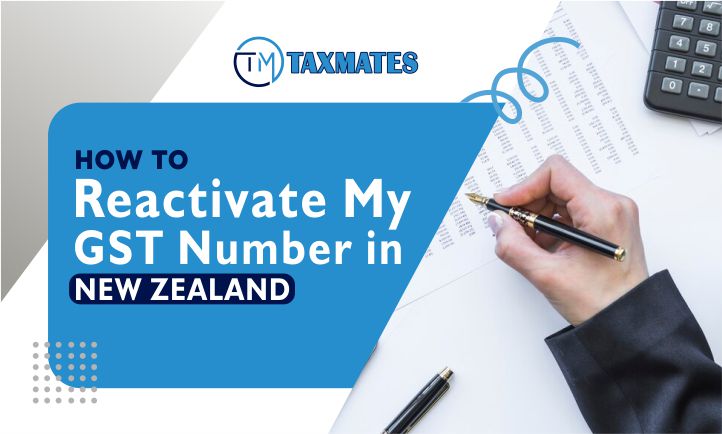New Zealand’s Goods and Services Tax (GST) is a fundamental pillar of the country’s taxation framework. It plays a pivotal role in revenue generation and serves as a means for the government to fund essential services. Each registered business is allocated a unique GST number, a critical identifier in the taxation process.
However, there are instances where businesses may find their GST numbers deactivated, often due to non-compliance or prolonged inactivity. If you are searching for GST number search nz, check gst number nz, gst number nz, IRD gst number search or a new GST number, feel free to read this article. This blog, “How to Reactivate my GST Number” provides a comprehensive guide to the step-by-step process and highlights the significance of such reactivation.
Reasons for Deactivation
Businesses in New Zealand may witness the deactivation of their GST numbers for many reasons. One prevalent cause is the failure to file GST returns within the stipulated time frames. An inactive status for an extended period can also trigger the deactivation process.
Understanding these reasons is imperative for businesses, enabling them to adopt proactive measures to prevent deactivation and ensure seamless compliance with GST regulations.
GST Reactivation Process
Reactivating a GST number involves a series of procedures and submitting specific documents. Businesses must be well-informed about the required documentation and whether the reactivation process can be executed online or necessitates offline procedures.
In this article, we Aim to provide comprehensive insights into the necessary steps for a smooth reactivation process, empowering businesses with the knowledge to navigate the reactivation intricacies.
Step-by-Step Guide to Reactivate GST Number
- Logging into the GST Portal: To initiate the reactivation process, log in to the GST portal using your credentials.
- Filling the Application Form: Provide accurate information in the reactivation application form. Any discrepancies might lead to delays.
- Document Submission: Attach the required documents, including proof of business activity and financial statements and reporting.
- Payment of Outstanding Dues: Clear any outstanding dues to expedite reactivation.
Required Documents for Reactivation
- Application Form: Businesses seeking to reactivate their GST numbers must fill out a designated application form. This form gathers essential information about the business accounts and its tax-related activities.
- GST Returns: Clearing any outstanding GST filing returns is often a prerequisite for reactivation. Businesses must ensure that all overdue returns are filed and any outstanding payments settled to proceed with the reactivation process.
- Proof of Compliance: Providing evidence of GST compliance with regulations is essential. This may include documentation showcasing adherence to tax laws and regulations during inactivity.
Online vs. Offline Reactivation
- Online Reactivation: In some cases, businesses may have the option to reactivate their GST service through online portals. This streamlined process often expedites the reactivation, providing a convenient and efficient solution.
- Offline Reactivation: Certain circumstances may necessitate offline procedures, requiring businesses to submit physical copies of documents to the relevant tax authorities. Knowing the preferred reactivation method is crucial for a smooth and hassle-free process.
Communication with Tax Authorities
- Open Dialogue: Establishing open communication with tax authorities is pivotal. Businesses should contact the appropriate authorities to seek guidance, clarify doubts, and ensure all requirements are met during reactivation.
- Timely Responses: Responding promptly to any queries or requests from tax authorities is essential. Delays in communication may prolong the reactivation process, impacting the business’s ability to operate smoothly.

Importance of Reactivating GST Numbers
GST registration NZ holds paramount importance for company formation and business. Some key reasons include:
- Legal Compliance: Operating with a deactivated GST number violates tax regulations. Reactivating the GST number ensures legal compliance, shielding businesses from potential penalties and legal repercussions.
- Business Continuity: A functional GST number is crucial for day-to-day business operations. Promptly reactivating the GST number is essential to maintaining continuity in financial transactions and business activities.
- Access to Benefits: Certain benefits, such as input tax credits, are tied to a valid GST number. Reactivating the GST number ensures businesses can continue to avail themselves of these benefits, contributing to overall financial efficiency.
- Avoidance of Penalties: Timely reactivation helps businesses avoid potential penalties associated with non-compliance. This proactive approach safeguards businesses from financial implications due to prolonged inactivity.
Common Issues and Solutions
Even with a careful reactivation process, specific issues may arise. Incorrect information in the application or delays in document verification can pose challenges. This section addresses these common problems and suggests solutions.
Tips to Avoid Future Deactivation
To prevent the hassle of reactivating your GST number in the future, it is advisable to adopt proactive measures. Regularly filing GST returns and staying informed about changes in GST regulations are key practices.
Benefits of a Reactivated GST Number
Reactivating your GST number has numerous benefits. It reinstates your business’s eligibility for certain transactions and ensures compliance with tax regulations, fostering a positive business environment.
Frequently Asked Questions (FAQs)
1. What are the reasons a GST number might be deactivated?
GST numbers in New Zealand might be deactivated for various reasons. Non-filing of GST returns within the specified time frames, Prolonged inactivity or inactive status for an extended period, and failure to comply with GST regulations and tax laws.
2. Is there a penalty for operating with a deactivated GST number?
Yes, there can be penalties for operating with a deactivated GST number. It violates tax regulations, and businesses may face financial penalties and legal repercussions for non-compliance.
3. Can I backdate my GST registration after reactivation?
Backdating GST registration is not allowed after reactivation. The registration is typically effective from the date of application or approval. It is crucial to adhere to the correct registration dates to ensure compliance with tax regulations.
4. What should I do if I’m unsure about my GST registration status?
Check with the New Zealand Inland Revenue Department (IRD) through their online portal or contact their helpline for assistance. Review your business records and ensure that GST returns are filed on time to maintain an active GST status.
5. How to register a GST number? Or how to get a GST number in NZ?
Check if your business is required to register for GST based on the threshold criteria. Gather necessary information, such as business details and financial records. Visit the Inland Revenue Department’s website or contact them to access the online registration form. Complete the registration form, providing accurate and up-to-date information. Submit the required documentation, such as proof of identity and business details. Await approval from the IRD, and once approved, you will be assigned a GST number.
Conclusion
Understanding the reactivation process for GST numbers in New Zealand is integral for businesses. Businesses can navigate the complexities of taxation regulations by comprehending the reasons for deactivation, the necessary steps for reactivation, and the importance of maintaining an active GST number.
Proactive engagement with tax authorities and adherence to the outlined procedures ensure a smooth and timely reactivation process, allowing businesses to continue their operations smoothly. Contact us at Taxmates NZ. We will be pleased to provide our expert taxation services.





